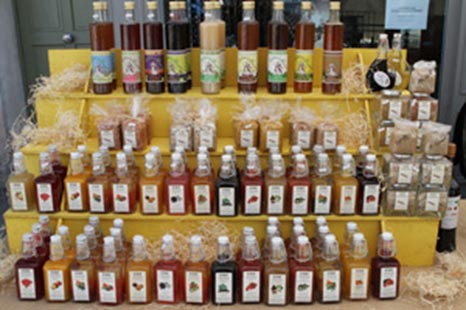Olive Oil
The Prophet also advised us to, “Use olive oil as a food and ointment for it comes from a blessed tree” (Tirmidi and ibn Maja).
In Crete, a recent study showed that even though 90% of Cretans consume an average of 60-70 pounds of oil a year per person, the incidence of coronary disease is very low compared to other countries.
Everyone knows that animal fats contain saturated fatty acids that vertically increase blood cholesterol levels. But mono-unsaturated fatty acids, like olive oil, control LDL levels while raising HDL levels. In fact, no other naturally produced oil has as large an amount of monounsaturated fatty acids (mainly oleic acid) as olive oil.
Olive oil also contains vitamins E and K, and polyphenols, which provide a defense mechanism that delays aging and prevents carcinogenesis, atherosclerosis, liver disorders, and inflammations. Oleates in the oil also promote bone formation in children and protect the bones of the elderly.
Even The Journal of the National Cancer Institute reported that olive oil offers strong protection in the fight against breast cancer.
📚 Read Also: Are Organic Foods Healthier?
Salt
Contrary to popular modern belief, salt is also a beneficial condiment. The Prophet said, “Salt is the master of your food. God sent down four blessings from the sky – fire, water, iron and salt” (Ibn Maja-Food book, hadith no. 3334).
UNICEF reports that the body needs only minute amounts of iodine (from iodized salt) to function properly. Yet, a lack of the nutrient causes various disorders, from stunted growth to cretinism, a most serious condition.
Even mild deficiency produces mental impairment. Studies estimate that children living in iodine- deficient areas forfeit up to 10 to 15 IQ points.
Doctors often recommend replacing water and salt lost during exercise and when working outside in jobs such as agriculture. Excess salt intakes can combat Chronic Fatigue Syndrome as well.
Dramatic deficiencies or “excessive” sodium intakes have been associated with other conditions and diseases such as stomach cancer. Testing the salinity of perspiration has proven to be a good test for cystic fibrosis. The hardest effect of salt is the association of dietary sodium and hypertension.
However, the American Society published a good overview of recent scientific evidence as a supplement to The American Journal of Clinical Nutrition for Clinical Nutrition in February 1997, and the Medical Journal of Australia reviewed that debate earlier this year. They found that the kidneys efficiently process this “excess” sodium in healthy people.
In fact, in cases of hypotension, genetic factors explain a quarter to a half of blood pressure variability – five times more than environmental factors such as stress, physical activity/exercise, smoking and, of course, diet. Among dietary risk factors, obesity is the most important. Then alcoholism and salt intake.
In May 1998, JAMA published a large meta-analysis confirming a 1996 study and documenting, as well, a series of adverse changes to blood chemistry among those placed on low-sodium diets in clinical trials.
All told, there have been six clinical trials, five of which were limited to randomized controlled trials. These provide consistent evidence of only a minor blood pressure response to a restriction of dietary sodium.
📚 Read Also: Miracles of Ultraviolet Rays for Human Health
Vinegar

The Prophet has also called vinegar a “blessed seasoning” (Muslim and ibn Maja, food book, hadith no. 3335). Modern science has confirmed that it indeed does have many “blessings.”
A recent book called, simply, Vinegar talks about many ways in which vinegar benefits our health, and cites numerous scientific proofs of this claim. However, ancients have known vinegar “miracles” even before the time of the Prophet (SAW).
The first-century Greek doctor Dioscorides was a careful observer of the medicine of his time.
In his writings, he describes the use of a substance he calls ‘oxymel,’ or sour honey, for arthritis-like pains.
Over the centuries, oxymel – a combination of apple cider vinegar and honey – has been useful in dissolving painful calcium deposits in the body, and for other health problems such as hay fever.
This is because apple cider vinegar is nutrient-rich, including amino acids, enzymes, manganese, magnesium, potassium, and silicon. It improves metabolism and can counteract the effects of excess lactic acid in the bloodstream released during exercise and stress.
It’s a tonic to help those with arthritis and blood pressure. That’s in addition to cholesterol, colds, constipation, cramps, diabetes, diarrhea, indigestion, muscle stiffness, and sore throat. In his over 300-page book Vinegar, D. Lawrence cites over 100 studies in praise of the condiment.
Many more claims of vinegar’s benefits are documented in respected journals like Science Digest, The Pharmacological Basis of Therapeutics and The Journal of the American Medical Association.
Perhaps, though, the most important thing we can learn from Prophetic nutrition is moderation. As we sort through the wisdoms of Prophetic nutrition in our attempt to reconcile them with modern “science,” we must always remember what the Qur’an (Surat Taha 20:81) says, {Eat of the good things We have provided for your sustenance, but commit no excess therein.}
To Be Continued
